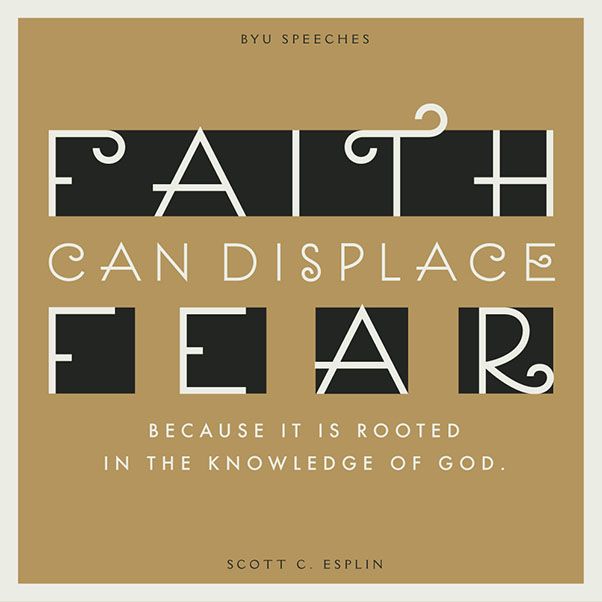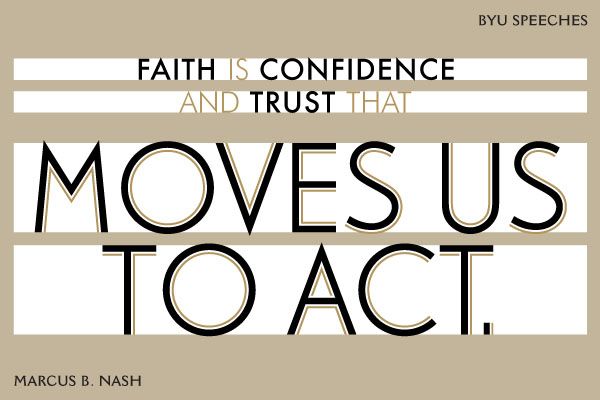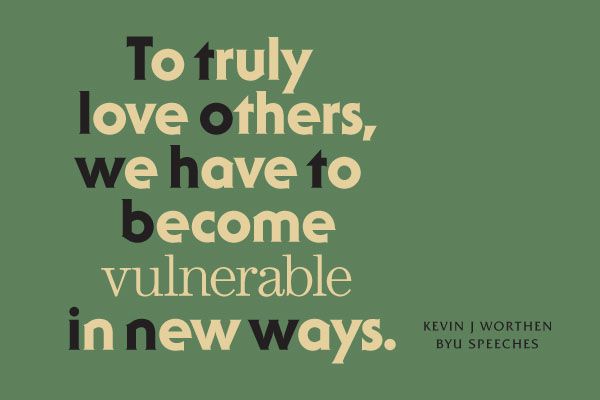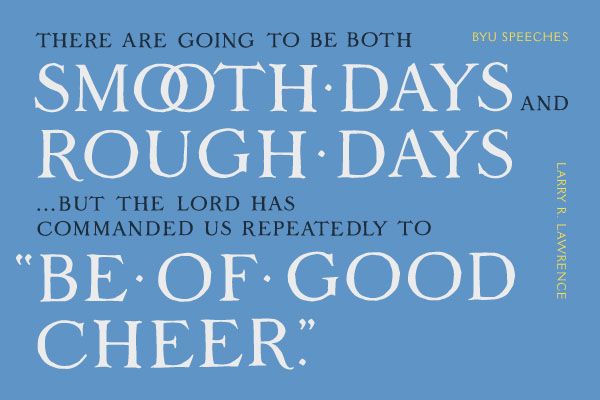Devotional Advice from Winter 2016
April 19, 2016 • Blog Post
The devotionals of winter 2016 included inspiring thoughts and counsel from three members of the Quorum of the Seventy as well as experts in Church history, nutrition, and athletics. Their words provided counsel and guidance on many gospel topics. Below are some questions with inspired answers given during this past semester of BYU devotionals.
How is Christ able to lift and teach us?
How do I proceed when I’ve prayed, but I’m still unsure?
What do I do when something causes me to question?
How do I overcome fear and perfectionism?
How can I have patience with my weaknesses?
What should I do next in my life? How do I make hard decisions about who to marry, what to study, where to work, etc.?
How can I best show my love and gratitude to others?
How do I choose the light in a world with so much darkness?
How do I keep my thoughts clean and pure?
How is Christ able to lift and teach us?
“Like other positive relationships, [our] eternal relationship [with Christ] comes at a price, but one largely paid by the Savior in Gethsemane and on the cross. As a result of His great and infinite atoning sacrifice, Christ is able, with total empathy, to mourn with us in whatever circumstance we find ourselves. He has paid the ultimate price for ultimate friendship. Just as we sometimes get to know God through our extremities, Christ became fully acquainted with us through His extremities as part of the Atonement. As a result, He can teach and lift us as no one else can.”
—Kevin J Worthen, “It Is Not Good That . . . Man Should Be Alone, ”January 5
How do I proceed when I’ve prayed, but I’m still unsure?
“Sometimes we may hesitate to move forward even after we have prayed. Perhaps we have not received the answer to our prayers that we thought we should have. We may begin to question and ask ourselves, ‘What if it is not the right thing to do?’ or ‘What if it doesn’t work out?’ . . .
“After we have made the decision to act and proceed in faith—knowing that we have taken all the right steps—and after we have carefully followed the recipe that we have been given, then we need to move forward and enjoy the process without too much concern for the specific ultimate outcome. Things may occasionally turn out upside down or topsy-turvy, . . . but with the proper perspective we can enjoy the sense of accomplishment that comes from moving forward with faith.”
—Peggy Worthen, “The Allegory of the Wedding Cake,” January 5
What do I do when something causes me to question?
“To have a question is good and is an opportunity to learn. So learn with faith. I have a few suggestions:
“1. Take time to fully study it out. Gather and learn all the facts with faith by study, discussion, and prayer. Spiritual things are only learned through spiritual methods, not mortal means. Develop the spiritual skills before trying to judge.
“2. Do not abandon everything you already know. Learn how the new information fits in to the doctrines and things you already know.
“3. Use trustworthy sources. The scriptures, the teachings of the Brethren, and the Holy Ghost are trustworthy sources. Bishop Krister Stendahl, a former dean of the Harvard Divinity School, has counseled seekers of truth to ask questions of those who believe rather than those who don’t believe.
“4. Put things in context. Evaluating something in isolation—independent of surrounding principles, conditions, or facts—leads to incorrect conclusions. Events of the past should be considered in the context of the past, not in the context of present-day social norms, laws, or conditions. Words can have different meanings in different time periods; words spoken in 1830 can have different meanings and implications than they have today. Use the right yardstick to measure and judge.
“5. Allow for the possibility that when there is a question, there may not be enough information available to readily answer it right now. In this case, you will have to exercise faith and patience and trust in your testimony that you have of other principles in the gospel—and of course, trust in God.”
—Allan F. Packer, “Finding Your Way,” January 12
How do I overcome fear and perfectionism?
“Part of becoming like and returning to our Heavenly Father, even when we feel so imperfect in relation to Him, includes believing in Him both as we repent and after. We typically, and rightly, recite in the fourth article of faith: ‘We believe that the first principles and ordinances of the Gospel are: first, Faith in the Lord Jesus Christ; second, Repentance.’ In doing so, we imply an order: faith comes first, then repentance. . . .
“Faith leads to repentance of our past mistakes. But all of us, including an eight-year-old girl who fears she isn’t perfect, need to follow up necessary repentance with belief—a belief in God and a belief that, though we all sin, the Atonement of Jesus Christ can and will save us. Such belief can replace our fears of the past with a joy in our present circumstances and a bright hope for our future. In the end, it is nurturing and acting on this belief that will do more than save us—it will perfect us.”
—Scott C. Esplin, “‘Daddy, Is Jesus Real?’ Overcoming Fear through Faith in Christ,” January 19
How can I have patience with my weaknesses?
“God loves all of His sons and all of His daughters, and He would have us know that each of us has the innate, divine capacity to exercise faith in Christ and receive all the Father offers His children. In other words, none of us is predestined to fail. However, we should recognize that each of us comes into this world with weakness, which I will define as desires or tendencies inconsistent with the plan of salvation. Such things, to one degree or another, are inherent in the human condition.
“Moroni taught that any son or daughter of God who will humble him- or herself before God and exercise steadfast faith will over time experience the miracle of Christ making ‘weak things become strong unto them.’ If we do not dictate a timetable to the Lord, we shall, like Joseph Smith, ‘out of weakness . . . be made strong.’ . . .
“For the faithful, such weakness is ultimately temporary, for when He comes again, God will ‘wipe away all tears from their eyes; and there shall be no more death, neither sorrow, nor crying, neither shall there be any more pain: for the former things are passed away.’
“Our Heavenly Father’s plan of salvation—making eternal life possible for us—is the greatest expression of love ever made. If we choose by faith to live according to His law despite our human weakness, we will one day receive all that the Father has!”
—Marcus B. Nash, “Guided Safely Home,” February 2
What should I do next in my life? How do I make hard decisions about who to marry, what to study, where to work, etc.?
“The most important educator we have in this life is the Holy Ghost. . . . Because of this other comforter—the Holy Ghost—we can receive guidance to know the path we should take in life. If we are willing to do all we can to pursue our dreams and then put our trust in God to take us on the path that He knows will lead to our greatest growth, we will be where God knows we need to be to become the person He intends us to become. . . .
“Most aspiring graduates will recognize this all-too-familiar question: ‘What are you going to do after you graduate?’ Sometimes it can be scary to think of what is next, but if we have an open mind and heart, God can lead us to great things.
“During my master’s program work, I had an opportunity to intern at a federal public health agency, and I thoroughly enjoyed the work. I was excited about the impact this work could have on individuals across the nation.
“During my doctoral program I had every intention of applying for employment at this agency, and I kept my contacts active within the division I had worked in as an intern. However, God had different plans for me. I knew that if I was offered a faculty position at BYU, this is where God wanted me to be. BYU extended me the job and, obviously, I accepted.
“This is just one of many experiences I have had in my life when, if I have been willing to accept the Lord’s will and listen, He has guided me to the path that is best for me. He does this for all of us.”
—Rickelle Richards, “Beauties of the Earth,” February 9
How can I best show my love and gratitude to others?
“An excellent way to express gratitude is by giving sincere praise. Praise lifts both the giver and the receiver. Mark Twain said, ‘I can live for two months on a good compliment,’ and most of us feel the same way.
“God showed us the importance of giving praise by His own perfect example. At the baptism of Jesus, Heavenly Father announced, ‘This is my beloved Son, in whom I am well pleased’ (Matthew 3:17). . . .
“If we truly want to emulate the Lord, we need to be looking for the good in others and then voicing it. If there is anything virtuous, lovely, of good report, or praiseworthy, we should be seeking after these things (see Articles of Faith 1:13). Praise is a precious gift that costs the giver nothing. So if you see something, say something.”
—Larry R. Lawrence, “Choose Happiness,” March 8
How do I choose the light in a world with so much darkness?
“Clinging to the light is a choice, and often that choice is challenging. We have heard the saying ‘I never said it would be easy, but it will be worth it.’ We all face challenges, and Satan loves to prey on us, especially during the difficult times. . . .
“I believe that one of his greatest tools is to provide situations in which we doubt ourselves, our unique spirit, and our mission here on earth. We then let those negative voices speak loudly in our heads—with phrases such as ‘I’m not good enough, smart enough, pretty enough, or skinny enough. I’m not worthy enough or strong enough. Life is too hard!’ Yes, life is hard and we are all challenged, and at certain times we are challenged more than at other times. We get scared of failure; we fear the unknown; and we are burdened with losses, sickness, and pain. All of these emotions leave us vulnerable, questioning, and sometimes searching for easy fixes. This often leads us to complain, blame, talk badly of others, and make excuses, and the light gets smaller and smaller and smaller.
“However, no matter what is thrown at us or whatever temptations and obstacles and darkness come our way, we always have a choice. Which voices do we let in? Which voices can drown out the darkness and fill our minds and souls with the light?
“We must intentionally use our voices that say, ‘I am strong. I can do this. I am a fighter, and I choose to walk in the light.’”
—Jennifer Rockwood, “Drawn to the Light,” March 15
How do I keep my thoughts clean and pure?
“There are many strategies you can use to control your thoughts. The critical thing is to consciously recognize the unwanted thought and acknowledge that it will lead to actions that lead to habits that lead to character and—eventually—your destiny. Once recognized, replace the unwanted thought with something uplifting. The void created by removing an unwanted thought must be replaced by something of value.
“One person shared with me that she replaces inappropriate thoughts by reflecting upon her temple covenants. She ponders on the words of the covenants and their sacred and eternal meaning. She reflects on the security these covenants personally bring to her, to her marriage, and to her young children. She also ponders on the promised and eternal blessings associated with each covenant.
“A returned missionary once shared that he tries to imagine the sublime glory of his Savior. This has helped him replace undesirable thoughts with virtuous ones that elevate his mind to a holier place. He tries to imagine what it was like for Joseph Smith when he saw God the Father and His Son Jesus Christ in their glory. He imagines what it would feel like to gaze into the Savior’s eyes and to feel of His approving love.
“A young woman once shared that when she recognized that an unwanted thought had crept onto the stage of her mind, immediate prayer provided her a safe refuge. She found that as she focused on sincerely speaking to her Heavenly Father, the unwanted thoughts seemed to melt away, and she felt peace as the Holy Spirit prompted her in her prayer.”
—Jeffery Bunker, “Of Starfish and Destinies,” April 5







